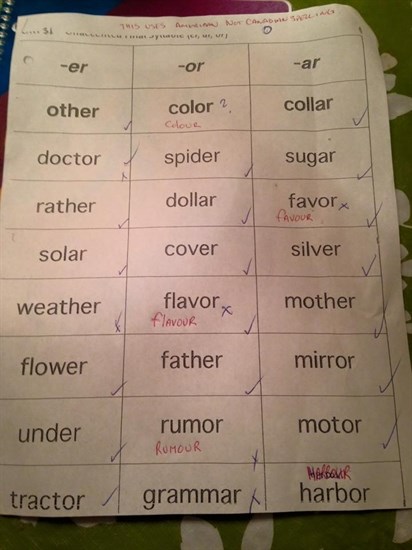
A Vernon parent was surprised to find these American spellings being used in her son's homework.
Image Credit: Facebook
November 03, 2015 - 8:00 PM
VERNON - Raise your hand if you pronounce the last letter of the alphabet ‘zed’ instead of ‘zee.’
What about colour versus color — do you spell it the first way or the second? Do you refer to the road less travelled, with two l’s or the road less traveled with one? Do you recognize where we’re going with this, or recognise it with an 's'?
The slight variances between Canadian English and American English are a big deal to many people, while others may be more inclined to simply rest the case as: ‘Both are right.’
As if English wasn't hard enough, many adults struggle with Canadian spelling rules, especially since our style borrows from both Britain and the United States. The ruling is murky at best, and it’s within this context that the topic came to light recently in Vernon when a local parent posted a photo of her son’s homework on Facebook. The spelling assignment gave the American format for words like ‘color’ and ‘flavor’ instead of the conventional Canadian way, leading the parent to question how it's taught in schools these days.
British Columbia’s school system is based on the British spelling model, and current curriculum packages from kindergarten through to grade nine call for Canadian spelling to be used. For example, the prescribed learning outcomes for grade 6 are for students to use the Canadian spelling for familiar and frequently used words, and to use a dictionary to find the correct Canadian spelling of words when editing.
But that’s all complicated by the fact that most textbooks and reading materials are printed in the United States. According to the Vernon School District, the use of these materials often leads to a crossover with American spelling.
It’s also common for spellcheck to automatically change words to the American version, the district says.
Ultimately, it’s up to individual teachers to decide how spelling is taught in their classrooms, and typically, whatever spelling format students are given to study would be the version considered correct on a spelling test, the district says.
Now, we want to turn it back to you, readers. Do you know the difference between Canadian and American spelling? What about your kids? In an age where words like ‘meh’ and ‘twerk’ have been added to the Oxford English Dictionary, does the minute difference of an added ‘u’ really matter?
To contact a reporter for this story, email Charlotte Helston at chelston@infonews.ca or call 250-309-5230. To contact the editor, email mjones@infonews.ca or call 250-718-2724.
News from © iNFOnews, 2015